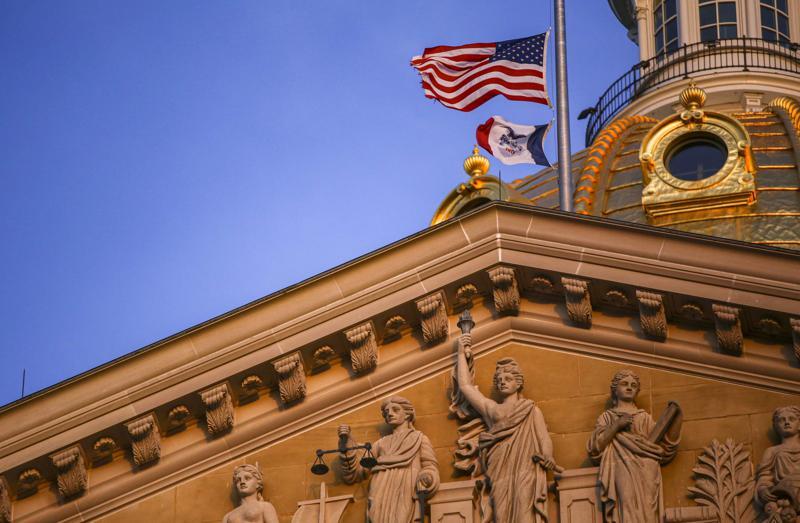Bills to criminalize pornographic images and videos that have been digitally altered to look like a specific person, known as “deepfakes,” were passed Wednesday by the Iowa House.
The bills come as legislators across the country consider how to respond to the emerging problem fueled by artificial intelligence technology.
One bill, House File 2240, would make a person who distributes a digitally altered image or video that portrays a person undressed or engaging in a sex act guilty of harassment. The bill builds on a law passed in 2017 that criminalized “revenge porn,” the distribution of porn images or videos of a person without consent.

 www.thegazette.com
www.thegazette.com
Another bill, Senate File 2243, adds deepfake or digitally altered images and videos to the definition of child pornography in Iowa law. Under the bill, digitally created or altered depictions of an identifiable minor engaged in a sex act would be treated the same as real photographs and videos. Possession of deepfake child porn would be punishable by a Class D felony for the first offense.
Both bills passed the House unanimously. The child exploitation bill has already passed the Senate, and is eligible to be signed into law by Gov. Kim Reynolds.
 Rep. Helena Hayes, R-New Sharon
Rep. Helena Hayes, R-New Sharon
Rep. Helena Hayes R-New Sharon, who proposed both bills in the House, said there has been a dramatic rise in AI-created, nonconsensual pornography.
“These AI-generated images are a more modern take on revenge porn, without a defendant needing to obtain compromising photographs of the intended victim,” she said.
In 2023, the FBI warned of a sharp increase in deepfakes being used in “sextortion” schemes, in which a person threatens to distribute sexually explicit images and videos of a person unless the victim pays.
Rep. Mark Thompson, a Republican from Clarion, said he met a South Carolina representative at a conference last year who lost his son to suicide because of an extortion scheme using pornographic images. He said there have also been cases of minors in Iowa being subject to similar extortion schemes.
“So if we take this bill seriously, and we implement it today, and we get it toward implementation, I think we have a good start on fighting that scourge,” he said.
A harassment charge under HF 2240 would constitute an aggravated misdemeanor, punishable by up two years in prison and a fine between $855 and $8,540.
Under the child pornography bill, the first offense would be a Class D felony, punishable by up to five years in prison and a fine of up to $10,245. A subsequent offense, a Class C felony, would carry up to 10 years in prison and a fine up to $13,660.
Other states have moved to crack down on deepfake pornography in recent years. At least 10 states have restrictions on the books, according to the Associated Press. Some states, like California and Illinois, allow victims to sue a person who creates fake images of them.
The bills come as legislators across the country consider how to respond to the emerging problem fueled by artificial intelligence technology.
One bill, House File 2240, would make a person who distributes a digitally altered image or video that portrays a person undressed or engaging in a sex act guilty of harassment. The bill builds on a law passed in 2017 that criminalized “revenge porn,” the distribution of porn images or videos of a person without consent.
Iowa lawmakers pass bills criminalizing 'deepfake' porn
The bills come as legislators across the country consider how to respond to the emerging problem fueled by artificial intelligence technology.
Another bill, Senate File 2243, adds deepfake or digitally altered images and videos to the definition of child pornography in Iowa law. Under the bill, digitally created or altered depictions of an identifiable minor engaged in a sex act would be treated the same as real photographs and videos. Possession of deepfake child porn would be punishable by a Class D felony for the first offense.
Both bills passed the House unanimously. The child exploitation bill has already passed the Senate, and is eligible to be signed into law by Gov. Kim Reynolds.
Rep. Helena Hayes R-New Sharon, who proposed both bills in the House, said there has been a dramatic rise in AI-created, nonconsensual pornography.
“These AI-generated images are a more modern take on revenge porn, without a defendant needing to obtain compromising photographs of the intended victim,” she said.
In 2023, the FBI warned of a sharp increase in deepfakes being used in “sextortion” schemes, in which a person threatens to distribute sexually explicit images and videos of a person unless the victim pays.
Rep. Mark Thompson, a Republican from Clarion, said he met a South Carolina representative at a conference last year who lost his son to suicide because of an extortion scheme using pornographic images. He said there have also been cases of minors in Iowa being subject to similar extortion schemes.
“So if we take this bill seriously, and we implement it today, and we get it toward implementation, I think we have a good start on fighting that scourge,” he said.
A harassment charge under HF 2240 would constitute an aggravated misdemeanor, punishable by up two years in prison and a fine between $855 and $8,540.
Under the child pornography bill, the first offense would be a Class D felony, punishable by up to five years in prison and a fine of up to $10,245. A subsequent offense, a Class C felony, would carry up to 10 years in prison and a fine up to $13,660.
Other states have moved to crack down on deepfake pornography in recent years. At least 10 states have restrictions on the books, according to the Associated Press. Some states, like California and Illinois, allow victims to sue a person who creates fake images of them.

